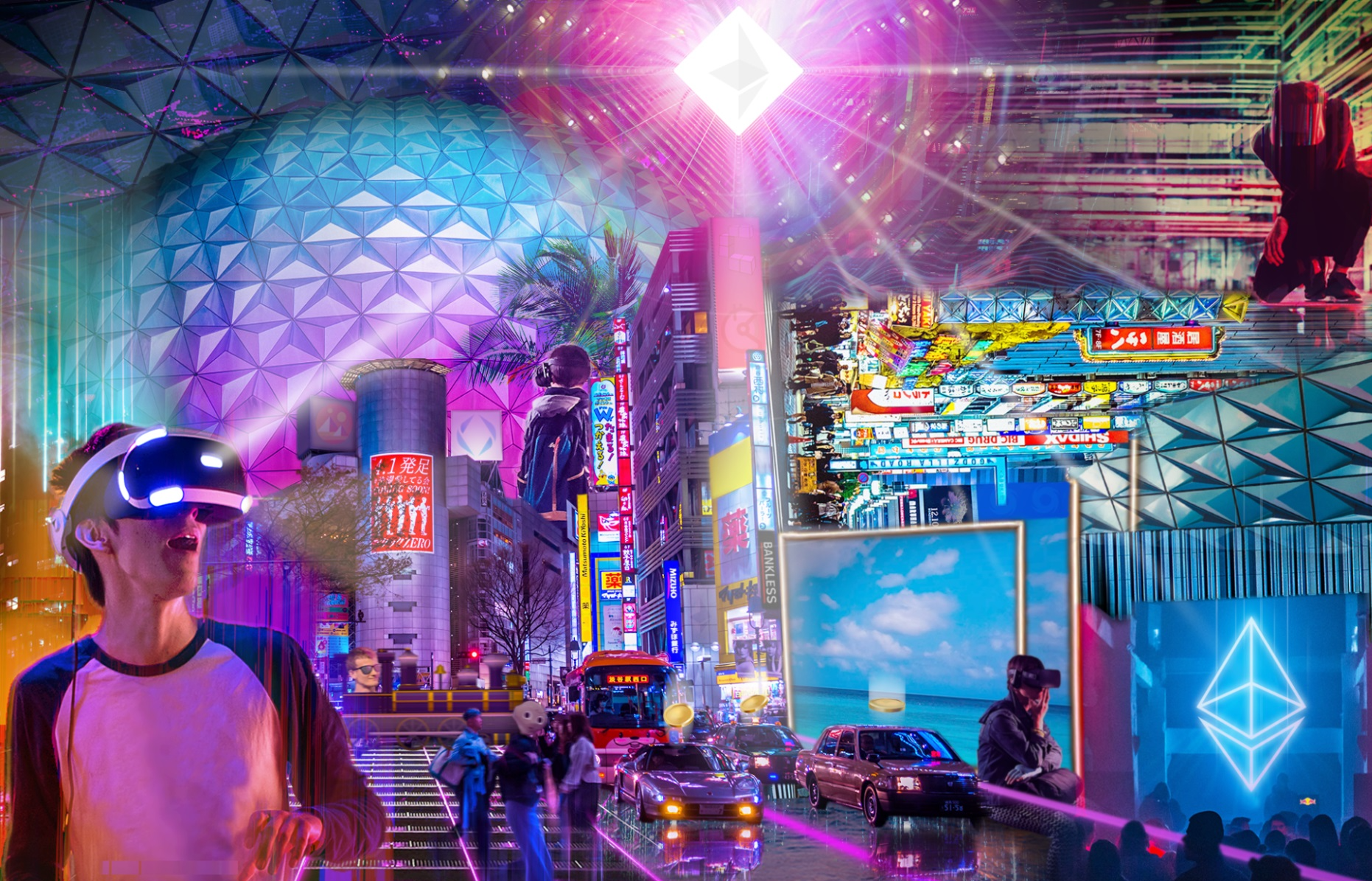
Metaverse Unraveled
Metaverse is based on romantic idealism: a stable, unshakeable system with utter disregard for existing economic predicaments, wonders of nature, and resources of the real world.
Prachi Mishra
What is Metaverse?
“The metaverse will feel like a hybrid of today’s online social experiences, sometimes expanded into three dimensions or projected into the physical world. It will let you share immersive experiences with other people even when you can’t be together — and do things together you couldn’t do in the physical world. It’s the next evolution in a long line of social technologies, and it’s ushering in a new chapter for our company.” (“Introducing Meta”)

Metaverse is no longer a textbook concept. Start-ups and even the Big Tech are pumping billions of dollars into developing the practical applications of the technology. The concept came to life when a young couple in Tamil Nadu decided to host their wedding reception on Metaverse . This not only catapults India towards a new technological renaissance but also poses several key ethical, economic, social, and public health concerns.
Whether in virtual reality or augmented reality, the promise of the metaverse allows a greater overlap of our digital and physical lives. As Zuckerberg has claimed in his keynote address this year, Metavsere will alter conventional wealth, productivity, shopping, and entertainment, underhandedly becoming the next evolution in the market. The form of virtual reality that is implemented in the Metaverse is in a form of freeform reality, a reality where users live in a virtual world, in a 3D character that they design and create called avatars, where they can buy and use objects like cars and houses which can be used to communicate in the Metaverse and interact with others.
In addition to these markets, users alone can use all the different currencies and crypto-currencies placed in the virtual reality itself, it can distinctly be defined as currencies used when entering specific businesses, or different virtual worlds of industries. Also, one individual can have as many different avatars they like for partaking in different activities of the Metaverse. For instance, one person A in the real world can have an avatar X for shopping and another avatar Y for talking to friends.
As most industries got affected by the pandemic through overstressed supply chains and reduced demand, the video game industry and its ecosystem have been one of the few to register exponential growth. With changes in consumer behavior driven by normalised stay-at-home routines, it comes as no surprise that most industries that required a people-to-people connect are moving into digital spaces and seeking to create digital doppelgangers of the goods and services they provide in the tangible world. The Metaverse launches a completely new era for marketing and advertising businesses, as the next frontier for expanding their brand’s business and targeting prospective new audiences.
In simple terms, the Metaverse will be a place where anything is possible to do and there will be no limit on how one spends their time in the virtual reality world. With endless possibilities of the Metaverse, we are faced with glaring reality:
· Is there an ethical basis to this kind of technological innovation?
· Will Metaverse be a silent pandemic severely affecting public health under the garb of fun and play?
· Will there be a negative or a positive paradigm shift in economic order of the day?, and
· Will the Metaverse have serious national security implications?
The most important reality of innovation is digital disruption. Digital disruption introduces new possibilities that are an outcome of a greater demand for increased tech-based functionalities, opportunities, and manipulation of those in the market. In turn, the digital economy of the Metaverse represents access to all kinds in various items, activities, and services, and more streamlined forms of remote consumption, a key factor for strengthening competition. This new virtual environment will be based solely on micro-level transactions with a high potential for addiction rather than being a place where people can really connect.

Technology ecosystems are not unidirectional directives issued from a CEO’s office. The success of any new disruptive technology will depend on several factors like formulation of cross-sectoral policies, setting up of strategic priorities, multi-sectoral and multi-lateral coordination, global penetration, the willingness to financially invest, incentive structures, adoption and adaptation of regulatory and legislative frameworks, proper monitoring and evaluation of the new product, a Theory of Change, and a well-defined audience. In this case, Metaverse will also have to address how other new technologies will be incorporated, like quantum technology, which will disrupt the existing encryption systems, potentially spearheading a revolution for new privacy and safety regimes. In this backdrop, the Metaverse looks ill-prepared.
Virtual reality and other innovations will have always been questioned for their ethical use. As has been observed in the last few decades, disruptive technology is potent enough to question the morality and ethics of human existence and perhaps even make us lose our ethics at times. The evergreen issues of fake news, online abuse and harassment, misinformation and disinformation, conspiracy theories, cybercrimes, and online frauds are yet to be solved in the 2D space, and their implications on the 3D world will only be more pronounced.
Socio-psychological implications of Meta
Social scientists, psychologists, and mental health experts opine that the reasoning given by Facebook (now, Meta) to develop a Metaverse have not been critically argued. Some believe that in order to stay ahead of his game, Zuckerberg has hastily announced, and perhaps planned, to develop Metaverse without thinking through the mental health implications of the technology. A few key considerations as highlighted by experts are:
· Increased surge in cases of serious psychoses like delusion and/or hallucination
· An increase in cases of cognitive dissonance
· Anti-social behaviour; extreme cases of violence can go up
· Possible increase in number of suicides
Metaverse will not be organised in a controlled clinical environment which implies that a lot of users can enter the virtual world to escape real-life problems. This is only detrimental to psycho-emotional-physiological well-being of people as the Metaverse cannot deliver a lasting solution to any of the real-world issues. Additionally, the following issues have been outlined:

Prolonged isolation and loneliness: COVID-19 pandemic has deteriorated mental health of adults and children alike. Most work and education has shifted online and the makers of Metaverse are oblivious to the fact that the virtual world will imply greater time being spent online leading to overuse of technology. Experts claim that such excessive use is associated with mental health disorders, like:
Somatic symptoms (six percent)
o Chronic depression (four percent)
o Psychoticism (half a percent)
o Paranoia (half a percent)
o Serious mental illness (two percent)
These results are an outcomes of a study conducted on South Korean children as an addiction to the internet .
· Digital technology and problematic symptoms: Research has shown that excessive use of internet and digital technology can lead to cognitive dissonance, disorganisation, and schizotypal personality behaviours. Schizotypal traits are similar to schizophrenia, leading to distortion of reality and long periods of absence from the real world .
· Child abuse and crime: Cases of harassment and abuse faced by adults on VR platforms has been well documented. When Meta becomes ubiquitous, children will be perhaps the most vulnerable to abuse. Since the virtual world will allow an individual to have many avatars, acts of virtual abuse and sexual violence will be rampant. While the creators of Metaverse have indicated development of features which will allow a user to enter a safe zone till they feel secure, there will be instances where children, especially females will find their rights violated. Metaverse is also highly vulnerable when it comes to child pornography . The real-life impact of the virtual acts can have a lasting impact on the minds of children. These issues are not fairly and reasonably addressed by innovators of Metaverse.
· Virtual reality can help in controlling delusions: There has been research that supports this argument. However, in those cases, people suffering from delusions, hallucinations, and other psychotic symptoms could cope only because they were being monitored in a clinically controlled environment4. Since Metaverse will not be a such a space for people with these disorders, their use of the technology can shoot up, leading to more complex psychological ailments.
· Escape route from facing the real world: Research suggests that people with schizotypal traits tend to gravitate more towards virtual environments compared to others. When their traits were measured in the virtual world against real life, the levels were found to be much lower in the virtual world. One reason people with schizotypal tendencies are attracted to the virtual world is that it allows them to escape from real world that triggers their condition5. However, prolonged use or rather a greater use of the virtual world, like the Metaverse can significantly increase their interaction with those who grasp reality very differently. This has the potential to put a full stop on the medical progress that has been made with patients with such traits. This also carries the potential to precipitate unusual and unpredictable interactions, further complicating the mental health condition of those with schizotypal traits.
· Putting the safety of others at stake: Metaverse might act as a safe, escape mechanism for those living with psychological disorders but whether that will ensure the safety of others interacting with the former category remains to be addressed by the developers. Scientists claim this has the potential to severely affect public health as it has not been scientifically tested and/or critically reasoned.
· The widening digital divide: For developing economies, new technologies and related development does not always usher in a new era of growth and inclusivity. For instance, in India where digital literacy and technology penetration is still low, Metaverse can only be a social impediment for actual growth and development of the youth in particular. Also, technological advancement tends to be accessible only to the top few percent of the population, making it elusive for the rest. In this scenario, Metaverse will not only deepen the digital divide but also shift the scales of true economic growth and development.
Metaverse has been widely criticized globally as it poses the risk for a public health menace. The COVID-19 pandemic restricted physical activity and normalised isolation and staying at home for prolonged stretches. With such technology becoming commonplace, the physiological and mental health balance among children will also be in question.
Economic implications of the Metaverse
When Metaverse becomes a reality, virtual reality-based social networking will enter the marketplace. The entire physical environment of the market will be shifted online which will have implications on many aspects of economic activity, like:
· Productivity
· Currency
· Trust in the marketplace
· Encryption and security of online transactions
· Online frauds and security breaches
The Metaverse will have two kinds of businesses, viz., native and non-native businesses, where native ones will be embedded solely in the fabric of the Metaverse while non-native businesses will be real world firms and agencies which will have an online presence in the Meta world . Conventionally, all marketplaces, both virtual and real ones are regulated in all countries. When Metaverse shifts them online, key considerations will be:
· Economic regulation and governance: In the Metaverse, it is likely that there will be disputes between the consumer and the seller and there will be a need for dispute resolution mechanisms. Will organisations like World Trade Organisation (WTO) be there or will they treated like non-native organisations is not known. Metaverse does not sufficiently address the issue of dispute resolution. Similarly, regulation of the VR-based marketplace which will be completely online, encompassing economies of all shapes and sizes is also unknown. Economic sovereignty will be put at stake. This can lead to serious economic fraud and financial crimes. Laws to regulate the marketplace will need to conceptualised.
· Online disruptions: The Metaverse will have complexly interwoven networks of processors, payment systems, and other such digital objects. Hacking into such a network would not only pose a cybersecurity threat but will also lead to disruption in online supply chains, loss of trust, loss of identity, and even shutting down of businesses. How the innovators of the Metaverse plan to cope with such a possibility or rather prevent such an malicious event is yet to be fathomed.
· Authentication issues: In the real world, all governments globally invest a lot to ensure that one identity is maintained by an individual. In case of multiplicity of a person’s identity, especially to conduct a business transaction, governments usually penalise the defaulter heavily. Now in the Metaverse, where people have the possibility of choosing an avatar, the personification and loss of identity by digital criminals will be far easier. Also, VR is not a standalone technology, as other technologies mature, like Artificial Intelligence, distinguishing between a computer and a human being is going to be more difficult . The Metaverse does not seem to touch base with this critical issue. Metaverse promotes having multiple identities/avatars to carry out different tasks and managing those in the economic realm is going to be very challenging.

· Getting past modern-day encryption: Quantum scientists and researchers around the world have projected quantum-based encryption algorithms to be common place in the coming decade . With this, the present-day encryption algorithms (based on binary 1s and 0s) will be easy to hack and break. If the Metaverse is going to be based on existing cryptology, economic transactions and commercial activities are going to be the worst hit once quantum tech becomes a reality.
· Questioning the trust in the marketplace: For online transactions that are carried out today, there is a certain degree of risk involved. After all financial frauds and related cybercrimes plague most economies today. When the marketplace shifts online, in the 3D space, it would be far more difficult to trust a seller with a given value of money. Solely because a buyer would not necessarily know who she is transacting with. Metaverse does not address this issue.
· Cryptocurrency: Metaverse will exist without borders and for online transactions to take place, users will need a currency to carry out commerce. The cryptocurrency debate has many shades as of today and for all countries to be on the same page cannot be envisioned right now . This aspect has again, not been well thought by the innovators.
The meta-ethics of Metaverse – Virtual Reality (VR)
Metaverse, the virtual world-to-be, will allow professionals, especially those in the marketing and communications fields, to track and trace users in 3D space. Earlier, what was limited to the click of a mouse, will now be extended to brainwaves, psychological responses, and body movements. With this insight in the coming decade, a new of challenges open for companies to build brands, evolve more unique ways of marketing, and deliver ads that suit the user. Most research carried out to date has pointed to three significant privacy risks that come along with virtual reality:
· Deep fakes
· Big Data management
· An exponential rise in cyber attacks
These issues will be more pronounced in Metaverse as the sensory impact of experiences reality outside of the natural world has not been fully understood. Nevertheless, a few key considerations should be noted:
· Creating a negative response: For brands and marketing firms relying on Meta, a mere advertisement can generate a negative and even violent reaction in the users\’ minds. For instance, in 2019, Burger King came up with an ad that allowed the user to burn the advert of one of their competitors . The user could experience burning a non-physical entity. While this could be seen as an act of jest for some, this could lead to mental health implications for many others.
· Protection of biometric data: Meta will allow firms and apps to gather both personal and non-personal data of the users. Like, when does a user enter the Metaverse, their virtual environment, their body moves, eyeball movement, pulse rate, and their psycho-emotional response to stimuli. It will be a challenge for Meta to safeguard all such personal data of the users, given that there have been firms based on augmented reality that have leaked such information in the past. Interestingly, the frameworks Meta will use to ensure data privacy are unclear.
· Health implications of Meta-friendly devices: For an average user to enter, explore, and partake in the Metaverse, brain-computer interfaces (BCIs) are being developed. These devices can be worn like 3D glasses or headphones, or intelligent wearable devices . These devices will be based on machine learning algorithms, enabling researchers and private firms to gather more and more information on users\’ brainwaves. At present, such data has been collected and collated only in labs with the prior permission of the respondents. In this scenario, how Meta will ensure that the unique thought patterns of users are protected and never misused is not argued by the developers.

· Blurring the right to privacy: In the Metaverse, every physically existent object can be replicated in the virtual world. For instance, buildings, homes, things, roads, tunnels, and everything in the physical world can be copied. These are called digital twins . Copying or simply recreating these objects will not only curb the privacy rights of the people but put their safety and security at stake. It would be highly unfair for just anyone to walk into someone\’s house without their prior permission. And even if Metaverse comes up with a provision to ask for the user\’s permission before creating a digital twin, privacy will be severely afflicted.
· Dealing with alternate versions of the truth: In July 2020, MIT and Mozilla released a video called In Event of Moon Disaster, which shows United States President Nixon announcing the failure of NASA\’s Mission Apollo 11 and that many astronauts died as the mission crash-landed . This, of course, is contrary to the truth. But the deep fake video of Nixon is an eye-opener and opens the floor for debate about the veracity of truth in the coming future. Considering this, Metaverse seems to be leapfrogging towards a hasty launch, much before any of these pressing questions have been thoughtfully addressed. If Meta is made widely accessible without a firm understanding of these issues, cyberspace is bound to get more malicious and manipulative.
· Protecting children in the Metaverse: As online gaming becomes more commonplace, researchers opine that the virtual world is detrimental for kids. The virtual world impacts memory, decelerates brain development, desensitizes them, slows down the emotional process, and makes them feel that a particular event has happened in reality . With Metaverse, where kids get to choose their avatar and carry out activities beyond their age and perhaps take on the identity of someone much older. Whether applications and firms will distinguish these false personifications is not known. Another aspect that concerns explicitly children are using high-tech devices like the BCIs . Metaverse has an additional task of ensuring that physiological development of the human mind, brain, especially among kids, is not put at stake for its profit-making endeavours .
· Addressing issues of the present-day online space: Today\’s world is gripped with several key points on the internet – hate speech, fake news, racism, misogyny, harassment, disinformation, child abuse, sexual violence and abuse, misinformation, computer and algorithmic biases, and security breaches. With Meta becoming a reality in the next five years, these issues will grow manifold and how Zuckerberg and his firm plan to deal with them is uncertain.
· Absence of a human-centric approach: The vision and telos of Metaverse are more consumer-centric than being human-centric. This makes Metaverse a highly technologically evolved platform that augments user experience and provides a creative marketplace. However, it does not intend to match pace with government policies. Since law and regulatory agencies will take time to adapt and adapt with Meta, it is critical for the developers of the concept to keep the human-centricity of the platform at the core of all technological innovation.
(Prachi is a research consultant at CIHS, focusing on technology, national security, and society.)
References
- https://tech.fb.com/connect-2021-our-vision-for-the-metaverse/
- \’Tamil Nadu Couple To Host India’S First Wedding Reception In Metaverse\’ (The Indian Express, 2022) https://indianexpress.com/article/trending/trending-in-india/tamil-nadu-couple-to-host-wedding-reception-in-metaverse-7728255/ accessed 19 January 2022
- Ha, J.H., Yoo, H.J., Cho, I.H., Chin, B., Shin, D., & Kim, J. H. (2006). Psychiatric comorbidity assessed in Korean children and adolescents who screen positive for Internet addiction. Journal of Clinical Psychiatry, 67(5), 821.
- Truzoli, R., Osborne, L.A., Romano, M., & Reed, P. (2016). The relationship between schizotypal personality and internet addiction in university students. Computers in Human Behavior, 63, 19-24.
Mittal, V.A., Tessner, K.D., & Walker, E.F. (2007). Elevated social Internet use and schizotypal personality disorder in adolescents. Schizophrenia Research, 94(1-3), 50-57. - Freeman, D., Bradley, J., Antley, A., Bourke, E., DeWeever, N., Evans, N., … & Clark, D. M. (2016). Virtual reality in the treatment of persecutory delusions: randomised controlled experimental study testing how to reduce delusional conviction. The British Journal of Psychiatry, 209(1), 62-67.
- \’The Metaverse Has A Groping Problem Already\’ (MIT Technology Review, 2022) https://www.technologyreview.com/2021/12/16/1042516/the-metaverse-has-a-groping-problem/ accessed 19 January 2022
- Schimmenti, A., Infanti, A., Badoud, D., Laloyaux, J., & Billieux, J. (2017). Schizotypal personality traits and problematic use of massively-multiplayer online role-playing games (MMORPGs). Computers in Human Behavior, 74, 286-293
- \’Doing Business In The Metaverse: Opportunity Or Threat?\’ (XR Today, 2022) https://www.xrtoday.com/virtual-reality/doing-business-in-the-metaverse-opportunity-or-threat/ accessed 8 January 2022
- \’The Turing Test (Stanford Encyclopedia Of Philosophy)\’ (plato.stanford.edu, 2022) https://plato.stanford.edu/entries/turing-test/ accessed 8 January 2022
- \’Computer AI Passes Turing Test In \’World First\’ (BBC News, 2022) https://www.bbc.com/news/technology-27762088 accessed 8 January 2022
- \’Quantum Key Distribution (QKD) – Quantum Technology\’ (Quantum Technology, 2022) https://qt.eu/discover-quantum/underlying-principles/quantum-key-distribution-qkd/ accessed 8 January 2022
- (2022) https://online.stanford.edu/future-for-cryptocurrency accessed 8 January 2022
- https://www.youtube.com/watch?v=nGU3Z-1zwDM
- \’Toward Brain-Computer Interfacing\’ (The MIT Press, 2022) https://mitpress.mit.edu/books/toward-brain-computer-interfacing accessed 8 January 2022
- \’What Is A Digital Twin? | IBM\’ (ibm.com, 2022) https://www.ibm.com/in-en/topics/what-is-a-digital-twin#:~:text=A%20digital%20twin%20is%20a%20virtual%20model,accurately%20reflect%20a%20physical%20object.&text=These%20sensors%20produce%20data%20about,applied%20to%20the%20digital%20copy. accessed 8 January 2022
- \’In Event Of Moon Disaster\’ (Arts at MIT, 2022) https://arts.mit.edu/in-event-of-moon-disaster/ accessed 8 January 2022
- Kaimara, P., Oikonomou, A. & Deliyannis, I. Could virtual reality applications pose real risks to children and adolescents? A systematic review of ethical issues and concerns. Virtual Reality (2021). https://doi.org/10.1007/s10055-021-00563-w
- Presence, Vol. 26, No. 4, Fall 2017, 453–464 doi:10.1162/PRES_a_00310 ª 2018 by the Massachusetts Institute of Technology
- \’The Facebook Files\’ (WSJ, 2022) https://www.wsj.com/articles/the-facebook-files-11631713039 accessed 8 January 2022


Wow Thanks for this posting i find it hard to get decent specifics out there when it comes to this content appreciate for the site website